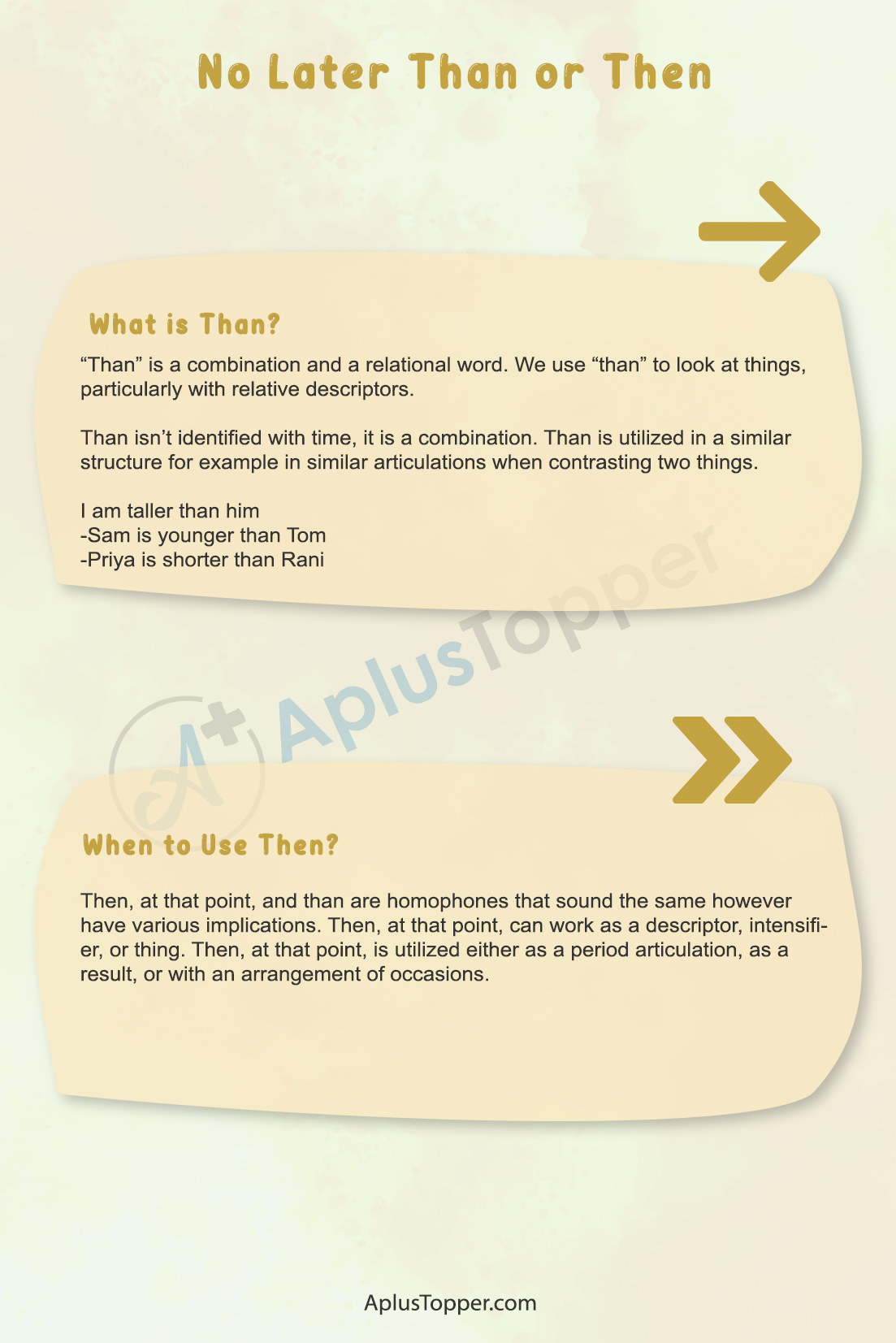No Later Than or Then: which is correct? No later than is the correct spelling. ‘Than’ and ‘then’ are the homophones words, that sound similar but are different in meaning. ‘Than’ is used to compare one thing with another whereas then is used as a time expression.
Homophones are words that sound similar yet have various implications. English has a huge number, and the greater part of them are befuddling.
‘Than’ and ‘then’ are two such homophones. Every one of these words has been in English for a long time, and they have mistaken journalists for comparably long.
For the entirety of the disarray that emerges with these two words, they are really various grammatical forms—’than’ is a combination and a relational word, while then, at that point, is a verb modifier.
Since the words mean various things, they can’t be utilized conversely, and you should know the contrast between them, particularly in phrases like no later than or then, at that point, just one of which is right.
No Later Than
No later than is an adverb expression. It indicates the external furthest reaches of when something can happen. Individuals ought to show up for work no later than the start of their movements. You ought to likewise recharge your vehicle’s enlistment no later than your birthday.
What is Than?
“Than” is a combination and a relational word. We use “than” to look at things, particularly with relative descriptors.
Than isn’t identified with time, it is a combination. Than is utilized in a similar structure for example in similar articulations when contrasting two things.
- I am taller than him
- Sam is younger than Tom
- Priya is shorter than Rani
No Later Then
No later then is an incorrect spelling of no later than, in light of the homophones than and afterward. Than is a combination that fills in as a component of near phrases, however at that point is an intensifier that indicates time, so no later than and no later then don’t mean exactly the same thing.
It’s justifiable that authors would befuddle than and afterward in this expression since it manages a point on the schedule. All things considered, no later than is the main right form of this expression.
When to Use Then?
Then, at that point, and than are homophones that sound the same however have various implications. Then, at that point, can work as a descriptor, intensifier, or thing. Then, at that point, is utilized either as a period articulation, as a result, or with an arrangement of occasions.
Examples on How To Use No Later Than or Then
- The person should arrive here no later than 10.30 PM.
- You must pay the bill no later than 20 days
- Sima should arrive at the office no later than 11.00 AM
- You must complete the job no later than tomorrow
- No later than the after tomorrow it will be done
- No later than a year after the release of the movie, it was a big hit

Difference Between Then and Than
The best approach to keep the pair straight is to zero in on this essential distinction: than is utilized when you’re discussing examinations; then, at that point, is utilized when you’re looking at something identifying with time.
Than is the word to pick in phrases like more modest than, smoother than, and farther than. What’s more, it’s the word that follows other, rather, less, and then some.
Then, at that point—the choice to pick when time is involved—fits in the expressions all of a sudden and in those days, and afterwards like since and until. It’s additionally in the expressions to say the very least, sometimes, and surprisingly then, at that point.
In a modest bunch of cases, however, ‘than’ is utilized to say that something happens following something different—that is, it’s pre-owned when you’re looking at something identifying with time. So in “No sooner had I clarified the standard than an exemption rung a bell,” it’s ‘than’ not then that is required. And furthermore, in barely had I clarified it than and hardly had I clarified it than.
So when did this combine get so confounding? Turns out they’ve generally been that way. Etymologically talking, they’re indistinguishable twins. In Middle English, they were a similar word; the two spellings were utilized for every one of the different implications. It’s been a couple of hundred years, be that as it may, since English has regarded them as particular, which implies we need to as well. We could return to Middle English, yet we believe that would be more earnestly then, at that point—um, that is, harder than—dominating these.
FAQ’s on No Later Than or Then
Question 1.
What does it mean by ‘no later than’?
Answer:
No later than means to do something by a specified time or period.
Question 2.
How to use no later than in sentence?
Answer:
We can have many examples of using the phrase ‘no later than’.
Reply to the mail no later than 7PM
The show must start no later than 4PM
This article should be published no later than end of this year
Question 3.
What is the main difference between then and than?
Answer:
Than is used to comparing whereas then is used with respect to time. For example, this poem is good than the previous one. Example of then: Have this medicine, then you feel better.
